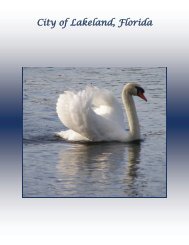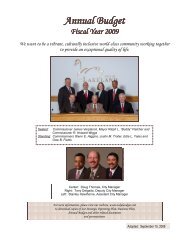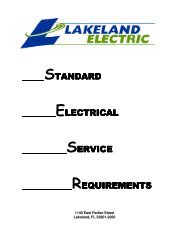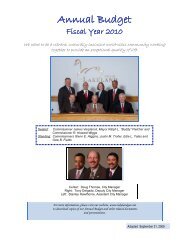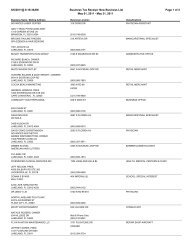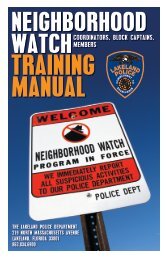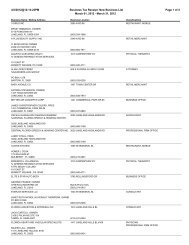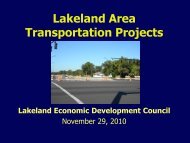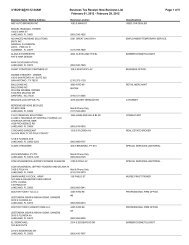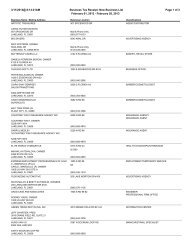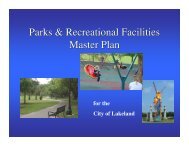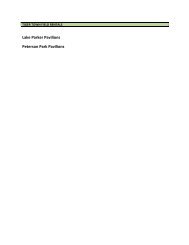Lakeshore Resident's Guide - Charlotte Harbor National Estuary ...
Lakeshore Resident's Guide - Charlotte Harbor National Estuary ...
Lakeshore Resident's Guide - Charlotte Harbor National Estuary ...
You also want an ePaper? Increase the reach of your titles
YUMPU automatically turns print PDFs into web optimized ePapers that Google loves.
LAKESHORE<br />
RESIDENT’S<br />
GUIDE<br />
Funding for this project made possible through grants from the<br />
Peace River Basin Board of the Southwest Florida Water<br />
Management District and the <strong>Charlotte</strong> <strong>Harbor</strong> <strong>National</strong><br />
<strong>Estuary</strong> Program as well as the Lakes Education/Action Drive<br />
Photo “Hancock Sunrise” courtesy of Lynette Spence
<strong>Lakeshore</strong> Resident’s <strong>Guide</strong><br />
Introduction<br />
Lake Hollingsworth shoreline, photo courtesy of City of Lakeland, Lakes & Stormwtater Division<br />
Welcome to the lake, where your adventure begins!<br />
As a lakeshore resident, you will experience changing environmental conditions, wildlife, recreational lake<br />
users (on most lakes) and governmental agencies, and sooner or later you will probably want to make some<br />
alterations to your property or the lakeshore. This packet has been created to be a useful tool with information<br />
about the lakes in the area in which we live and defines what your responsibilities are as a lakefront owner.<br />
This packet includes information about lake water quality, storm water runoff, aquatic vegetation (control<br />
and maintenance), wildlife, and boating safety, permitting requirements for lakeshore property owners, and<br />
resources to go to when you have questions (Important Numbers to Know section has a magnet attached so you<br />
can put it on your refrigerator!). As a lakeshore resident, you have privileges that other folks don’t, but you also<br />
have a responsibility to educate yourself about the environment you’ve chosen to live near. Your actions have a<br />
direct impact on the water quality of your lake, so, even if you've lived at the lake for a while, we feel that some<br />
pertinent environmental information and resources would be of value to you, and we’ve tried to include them in<br />
this packet.
IMPORTANT NUMBERS TO KNOW<br />
Local Government and Area Agencies:<br />
Water Pollution & Litter<br />
Polk County (Keep Polk County Beautiful) . . . . . . . . . . . . . . . . . 533-8423<br />
(Polk County Natural Resource Division) . . . . . . . . 534-7377<br />
Lakeland (Lakeland Clean & Beautiful) . . . . . . . . . . . . . . . . . . 834-3306<br />
(Lakes & Stormwater Division- Lakefront Clearing and<br />
New docks ) . . . . . . . . . . . . . . . . . . . . . . . . . . . . . . ..834-3300<br />
Winter Haven (Keep Winter Haven Clean & Beautiful). . . . . . . . . 291-5662<br />
(Lakes & Natural Resource Division- Lakefront Clearing and<br />
New docks) . . . . . . . . . . . . . . . . . . . . . . . . . . . . . . 291-5881<br />
Lakes Region Lake Management District<br />
(Winter Haven Canal Commission) . . . . . . . . . . . . . . . . . . . . . . . . . 293-1441<br />
Extreme litter including appliances on rights of way . . . . . . . . . . . . .877-891-6430<br />
Florida Fish & Wildlife Conservation Commission<br />
General information (Lakeland SW Regional Office ) . . . . . . . . . . 863-648-3206<br />
Fish Kills . . . . . . . . . . . . . . . . . . . . . . . . . . . . . . . . . . . . . . . . . . . . . 800-636-0511<br />
Bird deaths (unusual number dead) . . . . . . . . . . . . . . . . . . . . . . . . 863-648-3205<br />
Development activity near endangered/ threatened species . . . . . 888-404-3922<br />
Illegal hunting or poaching . . . . . . . . . . . . . . . . . . . . . . . . . . . . . . . 888-404-3922<br />
Nuisance alligator . . . . . . . . . . . . . . . . . . . . . . . . . . . . . . . . . . . . . . 888-404-3922<br />
Injured or dead endangered/threatened species . . . . . . . . . . . . . . .888-404-3922<br />
Florida Department of Environmental Protection (FEDP)<br />
Lakefront Clearing . . . . . . . . . . . . . . . . . . . . . . . . . . . . . . . . . . . . . . 863-534-7074<br />
New fencing on sovereignty lands . . . . . . . . . . . . . . . . . . . . . . . . . . 813-744-6100<br />
New docks (also see local governments) . . . . . . . . . . . . . . . . . . . . . 813-744-6100<br />
Dredging and filling activities relating to single family residences (not part of new development) such as new<br />
docks, seawalls, boat ramps, fences, sand beaches; dredging or filling for the residence itself, including septic<br />
systems, pools, garages, fences . . . . . . . . . . . . . . . . . . . . . . . . . . . 877-272-8335 or www.savefl.org<br />
Southwest Florida Water Management District (SWFWMD)<br />
General Information (Bartow Office) . . . . . . . . . . . . . . . . . . . . . . . . . 863-534-1448<br />
Well Construction Violations . . . . . . . . . . . . . . . . . . . . . . . . . . . . . . . .800-423-1476<br />
Watering Restrictions . . . . . . . . . . . . . . . . . . . . . . . . . . . . . . . . . . . . . 800-423-1476<br />
Irrigations Violations . . . . . . . . . . . . . . . . . . . . . . . . . . . . . . . . . . . . . .Call local police or sheriff’s office or .<br />
. . . . . . . . . . . . . . . . . . . . . . . . . . . . . . . . . . . 800-423-1476<br />
Dredge and fill for large developments . . . . . . . . . . . . . . . . . . . . . . . .800-423-1476<br />
Health Department<br />
Questionable septic tank placement or illegal septic dumping. . . . . . 863-519-8330<br />
Suspicious bird death for West Nile Virus (crows, jays, doves, birds of prey) 800-871-9703<br />
Hazardous Materials<br />
Dial 911 and ask for Fire Services<br />
Injured bird and mammal hotline:<br />
Woodland Wonders . . . . . . . . . . . . . . . . . . . . . . . . . . . . . . . . . . . . . . 863-967-3298<br />
Emergency Veterinarian . . . . . . . . . . . . . . . . . . . . . . . . . . . . . . . . . . . 863-676-1451<br />
Suspected rabies – Animal Control . . . . . . . . . . . . . . . . . . . . . . . . . . .863-499-2600 #2
What do I need a permit for?<br />
Local governments as well as federal agencies regulate what you can do with and on lakefront property. Before you buy,<br />
before you build, and before you make changes to your shoreline or dock, find out what regulations the city, county or state<br />
might have and what permits you might need.<br />
Different agencies have different responsibilities for protecting the waterbody and regulating its use. The activities listed<br />
below may require one or more permits from one or more agencies:<br />
New dock construction requires permitting from FDEP for sinking your posts, but the SWFWMD as well for<br />
waterflow and boat traffic safety and from your local government agencies.<br />
Call your local government agency: Lakeland: 834-3300, Winter Haven: 291-5881 as well as<br />
FDEP: 813-744-6100 and SWFWMD: 863-534-1447<br />
Shoreline clearing requires permitting from FDEP as well as your local government agencies.<br />
Call your local government agency: Lakeland: 834-3300, Winter Haven: 291-5881 as well as FDEP: (813) 744-6100<br />
Adding fill to your shoreline requires permitting from FDEP as well as your local government agencies<br />
Call your local government agency: Lakeland: 834-3300, Winter Haven: 291-5881 as well as FDEP (813) 744-6100<br />
Building a sea wall requires permitting from FDEP as well as your local government agencies<br />
Call your local government agency: Lakeland: 834-3300, Winter Haven: 291-5881 as well as FDEP (813) 744-6100<br />
Adding riprap material to shoreline requires permitting from your local governmental agencies as well as FDEP<br />
Call your local government agency: Lakeland: 834-3300, Winter Haven: 291-5881 as well as FDEP (813) 744-6100<br />
Shoreline re-vegetation Call your local government agency (Lakeland: 834-3300, Winter Haven: 291-<br />
5881) and FDEP 863-534-7074 or (813-744-6100)<br />
Plant removal along a shoreline requires permitting from FDEP as well as your local government agencies<br />
Call your local government agency: Lakeland: 834-3300, Winter Haven: 291-5881 as well as FDEP (863) 534-7074 or<br />
(813) 744-6100.
WHAT CAN I DO TO SAVE OUR LAKES?<br />
The actions of lakefront property owners are crucial to the health of our lakes. Below is a list of how you can protect your<br />
lake and its ecology and health for your future enjoyment.<br />
Please How? Why?<br />
Let’s Go Wild!<br />
Loose the<br />
beach!<br />
o Leave trees and shrubs in a strip along<br />
the shore.<br />
o Replant native trees and shrubs between<br />
your house and the water.<br />
o Reduce lawn size next to the lake.<br />
o Don’t use fertilizers or pesticides on<br />
lawns near a lake.<br />
o Create a vegetative bank with native<br />
plants instead of a retaining wall.<br />
Don’t add sand or other fill to the lake<br />
o Lawns are not effective at erosion<br />
control as trees and shrubs are.<br />
o Natural vegetation stabilizes the<br />
bank, enhances habitat, and looks<br />
nice from the lake.<br />
o Fertilizer and pesticide runoff adds<br />
pollutants to the lake.<br />
o Visit the Florida Yards &<br />
Neighborhoods website for more<br />
info on native plants<br />
(http://floridayards.org/)<br />
Adding sand suffocates the natural bottom<br />
habitat plus can introduce silt to the water.<br />
(A permit is required if adding fill to a lake)<br />
Watch the<br />
ducks<br />
Take care who<br />
you invite to<br />
your home<br />
Build<br />
Responsibility<br />
Don’t feed the wildlife (just observe them!)<br />
Make sure you are not transporting organisms<br />
and vegetation from one lake to another.<br />
Carefully wash and inspect your boat prior to<br />
leaving the lake. Hydrilla can survive out of the<br />
water for a while.<br />
Any work in the lake such as dock or sea wall<br />
building will require a permit (see Important<br />
numbers to know)<br />
Wildlife increases disease bacteria in the<br />
water as well as increases nutrients to the<br />
lake. Create a natural vegetative buffer and<br />
they will feed on it.<br />
Exotic plant and animal infestations are a<br />
serious problem in Florida lakes.<br />
Artificial structures alter the natural<br />
functions of a shoreline, by removing<br />
vegetation and altering the natural lake<br />
bottom. Also improperly done work can<br />
cause excess turbidity in the water!<br />
Wash it right Wash cars on the lawn instead of on the driveway Washing the car on the driveway adds<br />
excess nutrients to the storm drain<br />
systems. Washing on the lawn adds these<br />
nutrients to the grass, which will help it<br />
grow!
Lake Water Quality – Is my lake clean?<br />
Is my lake clean?<br />
Which lake is the cleanest lake in Polk County? This is a common question asked of LE/AD and lake managers<br />
around the county. The answer is not simple. Lake managers typically look at the health of a lake by measuring many<br />
factors, including chemical and biological indicators. Lake quality also depends on the lake usage. If you are an avid<br />
fisherman, you probably do not want a very clear lake with little vegetation. But if you were a water skier or jet skier, you<br />
probably would love a clear lake.<br />
When we talk about lake water quality, we usually talk about the sources that enter a lake to affect the quality. In<br />
most cases newly formed lakes are nutrient poor and have clear water. Over time, nutrients, sediments and pollutants from<br />
the surrounding areas make their way to the lake. Plant and animal growth become abundant in the lake and the lake<br />
ultimately becomes filled with sediment and muck. This is how lakes age (eutrophication).<br />
Nutrients<br />
One of the biggest challenges for lake managers is over-enrichment of our lakes with nutrients like phosphorus and<br />
nitrogen. Plants use these nutrients to grow and reproduce. Phosphorus and nitrogen enter the lake through stormwater<br />
runoff. The runoff picks up excess fertilizer and materials in the roadway and carries them into the stormdrains. These<br />
stormdrains then flow into area lakes. Nutrients entering the lake feed the algae (small free floating plants) and other floating,<br />
submerged, and shoreline plants, increasing plant production. Plant production can cause a lake to become shallower by<br />
increasing algae and plant growth. When the plant dies, it sinks to the bottom forming a muck layer.<br />
You keep talking about plants, what do they have to do with water quality?<br />
Aquatic plants are beneficial to lakes because they use and store these nutrients, removing them from the water<br />
column therefore helping to improve water quality. Plants along the shoreline help to prevent erosion and aquatic plants<br />
provide cover for fish and substrate for aquatic invertebrates. They also provide habitat, nurseries and food for fish and<br />
animals and produce oxygen.<br />
If you would like to learn more about water quality in your lake, check out the Polk County Lake<br />
Atlas at http://www.polk.wateratlas.usf.edu/<br />
or information about Florida native plants check out the local chapter of the Florida Native Plant<br />
Society at http://www.fnps.org/pages/chapters/chapterpg.php?keyword=Heartland or Florida Yards &<br />
Neighborhoods program at http://floridayards.org/
Stormwater Runoff – It doesn’t just go away!<br />
What is stormwater runoff?<br />
Areas covered by asphalt or concrete prevent water from seeping into the ground. When it rains, much of the water<br />
flows to streams or lakes becoming stormwater runoff. As new developments and shopping centers are constructed, the<br />
more surface stormwater runoff is generated because the water cannot seep into the ground. As it rains, water picks up<br />
pollutants such as oil, trash, lawn debris, fertilizers and pesticides. These pollutants make their way to our lakes through the<br />
stormdrains.<br />
Should we really be concerned about stormwater runoff? How bad can it be?<br />
The replacement of vegetation (grass and shrubs) with concrete and asphalt reduces the ability of the land to remove<br />
pollutants from water as it travels through the areas that drain to our lakes. It’s like dumping pollution directly into our lakes!<br />
Stormwater runoff is the number one source of pollution in our lakes. This runoff can harm aquatic life and possible<br />
contaminate groundwater drinking sources.<br />
How can stormwater pollution be prevented?<br />
Use common sense! Native plants require less fertilizer and water, therefore reducing the amount of pollutants in<br />
your stormwater runoff. Dispose of your yard waste properly. Bag or mulch it. Don’t blow it into the streets. Wash your car<br />
on your lawn. This allows the runoff to filter into the ground not the street. Dispose of hazardous liquids properly. Don’t be<br />
lazy and throw that battery down the stormdrain. Don’t dump or wash your paint cans in the stormdrain. Care!
Recreational Laws and Regulations<br />
Boating<br />
If you enjoy boating, whether it’s canoeing, motor boating or jet skiing, you need to know about<br />
requirements from local, state, and federal agencies like boat registration and safety.<br />
Below are some of the current rules and regulations for recreational boats and boating:<br />
Your motor-powered boat needs to be registered and/or numbered to operate in Florida waters.<br />
Exceptions might include those operating a boat on “private lakes” and those, which have a<br />
current number from another state or county and are here fewer than 90 days. Most must be<br />
titled in Florida.<br />
All boats must have at least one U.S. Coast Guard approved personal flotation device (PFC) per<br />
passenger on board. Boats 16 feet or longer must have one for every passenger plus one<br />
throwable device.<br />
Florida law requires every child under 6 to wear a PFD aboard any vessel under 26 feet while<br />
“underway”.<br />
Florida law requires at least one B-1 type approved hand portable fire extinguisher on board<br />
along with one approved back-fire arrester bell whistle, and visual distress signals.<br />
Operating a motorboat while intoxicated is both a federal and state offense and may be subject to<br />
fine or imprisonment and points against your driver’s license!<br />
Channel 16 VHF-FM is a calling and distress channel that you can use if you need help.<br />
Anyone under the age of 21 must complete a boating safety course in order to operate a<br />
watercraft with an engine greater than 10 horsepower.<br />
For more information on boating safety and regulations, the State of Florida, through the Florida Game<br />
and Fresh Water Fish Commission and the Florida Marine Patron, publish a “Boater’s <strong>Guide</strong>” available<br />
through your local tag agency. Free boating courses are available through the Florida Game and Fish<br />
Commission or you can call 1-800-366-BOAT for information on free boating courses given by the U.S.<br />
Coast Guard Auxiliary and other agencies.<br />
Also visit http://myfwc.com/boating/ for more information.
Recreational Laws and Regulations<br />
Fishing<br />
With Florida’s warm climate, we have some of the greatest warmwater fishing in the world! With over<br />
7000 lakes around the state and with 540 of them in Polk County, fishing in Florida has a lot to offer. As<br />
a lakefront property owner, you are on the front lines! But before you go out make sure you have your<br />
fishing license if necessary and know the fishing regulations in your area.<br />
Do I need a fishing license? Yes, if you are between the ages of 16 and 65 years of age. You can get<br />
your license from your county tax collector or store that sell tackle and sporting goods. You must have<br />
your license on you when you are fishing. If you are 65 or over or disabled, you must carry either a<br />
Senior Citizens Certificate or Permanent Hunting and Fishing Certificate (these are free from the county<br />
tax collector).<br />
Note: there are some exceptions to the license requirement. If you are totally and permanently disabled you do not<br />
need a license. If you use a Cane Pole you are exempt from needing a license in your county if you fish with a cane pole or<br />
line only (no reel), use live or natural bait, or do not fish for commercial purposes. You do need a license to fish in any lake<br />
designated as a Fish Management Area, regardless of your fishing method.<br />
For more information about fishing licenses go to http://myfwc.com/fishingareas.html or call 1-888-FISH<br />
FLORIDA
References<br />
State and local regulations change from year to year. Make sure that you are familiar with current<br />
requirements. For more valuable information on waterfront property care, please check out the following<br />
references:<br />
Waterfront Property Owners <strong>Guide</strong> created in 2001 by the Florida Department of Environmental<br />
Protection. This is a 40-page guide to help waterfront property owners become educated and broaden<br />
their awareness on the causes, effects and prevention of water pollution. For information on how to<br />
obtain one of these guides, go to http://www.dep.state.fl.us/water/nonpoint/docs/nonpoint/wpog.pdf or<br />
call 1-850-488-3605.<br />
Living at the Lake, a handbook for Florida Lakefront Property Owners by Marilym Bachmann, Mark<br />
Hoyer and Daniel E. Canfield, Jr. in conjunction with the University of Florida, Institute of Food and<br />
Agricultural Sciences (IFAS) and the Florida Cooperative Extension Service. To order a copy of this<br />
book, call 1-800-226-1764 and ask for publication SP247.<br />
The Florida Boater’s <strong>Guide</strong>, a handbook of boating laws and responsibilities by Florida Fish and<br />
Wildlife Conservation Commission. Information on boating safety and regulations, the State of Florida,<br />
through the Florida Game and Fresh Water Fish Commission and the Florida Marine Patron, This guide<br />
is available through your local tag agency.



